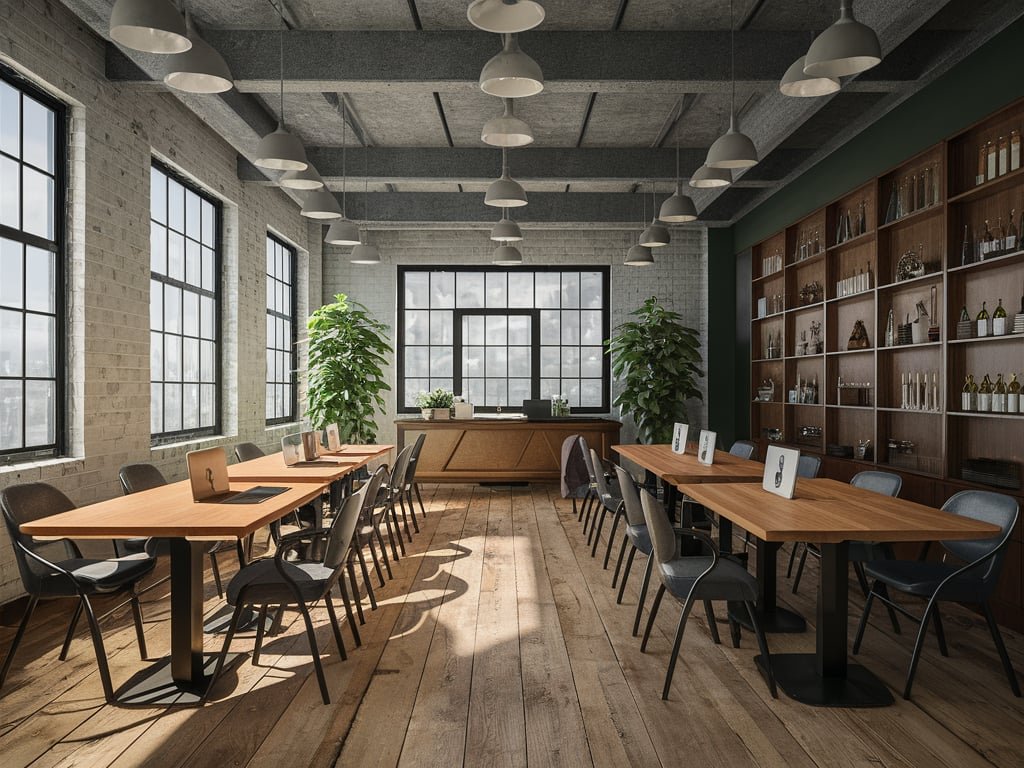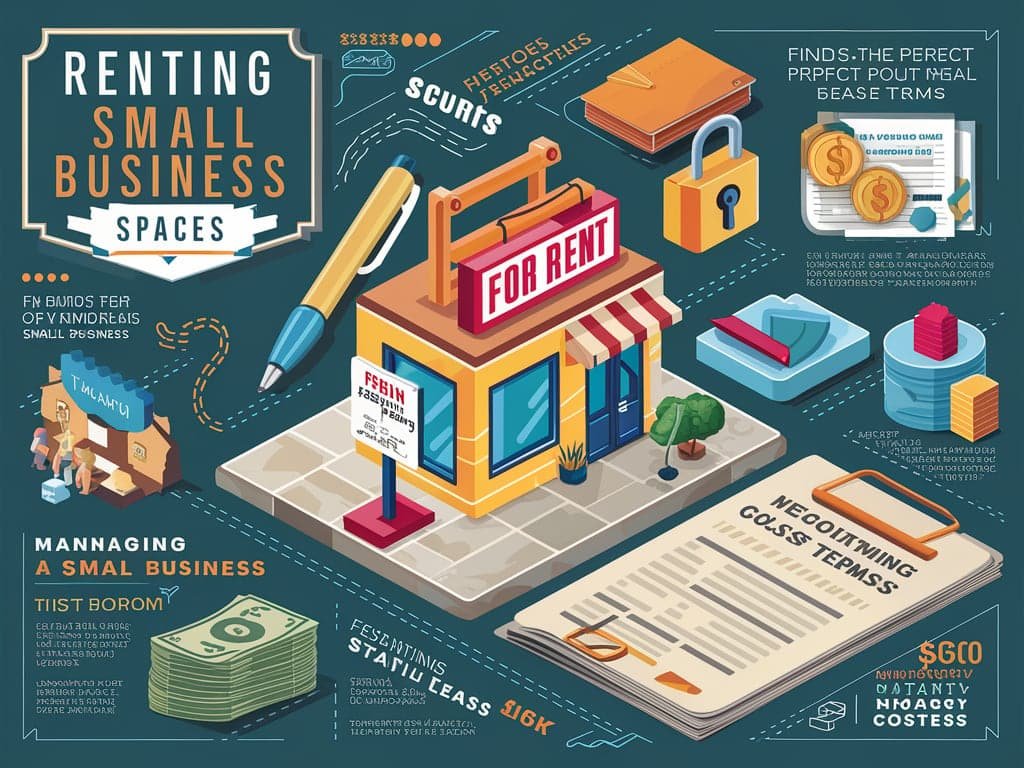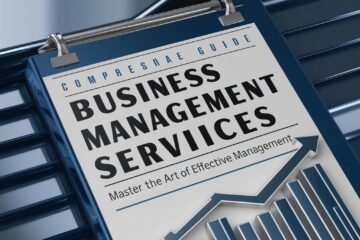Renting space for your small business is a significant step that can impact the growth and success of your company. The right location can attract more customers, provide a professional image, and give you the room you need to grow. However, finding the perfect space that fits your business’s needs and budget can be a challenge, especially for startups and small businesses.
In this guide, we will explore everything you need to know about renting a small business space, including the factors to consider, the different types of spaces available, and how to make the best decision for your business. Additionally, we will provide a table to help you compare different types of business spaces based on key factors like cost, flexibility, and amenities.
Why Renting Business Space Matters
The space you choose for your small business is more than just a physical location. It’s an essential part of your brand, customer experience, and day-to-day operations. Whether you’re a retail shop, an office-based company, or a service provider, the space you occupy can significantly impact your business’s success.
Benefits of Renting Business Space
- Professional Presence: A physical location gives your business a professional appearance, which can help build trust with customers and clients.
- Customer Accessibility: Renting a space in a prime location makes it easier for customers to find and access your services.
- Room for Growth: Having a dedicated space allows you to expand your operations, hire more employees, and offer additional services.
- Networking Opportunities: Renting in a commercial building or co-working space often provides opportunities to network with other businesses.
Challenges of Renting Business Space
- Cost: Rent can be one of the largest expenses for small businesses, especially in high-demand areas.
- Long-Term Commitment: Many commercial leases require long-term commitments, which can be risky for small businesses.
- Operational Constraints: The space you rent may come with restrictions on how you can use it, which could limit your business operations.
Types of Small Business Spaces for Rent
There are various types of spaces available for small businesses, each with its own set of advantages and disadvantages. Depending on your industry, budget, and business needs, one type of space may be more suitable than another.
1. Retail Spaces
Retail spaces are ideal for businesses that rely on foot traffic, such as boutiques, restaurants, and specialty shops. These spaces are typically located in shopping centers, malls, or high-traffic urban areas.
Pros:
- High visibility and accessibility to customers.
- Ability to create a unique storefront to attract customers.
- Often located in busy commercial areas with other complementary businesses.
Cons:
- High rental costs, especially in prime locations.
- Long-term lease commitments.
- Additional expenses for utilities, maintenance, and insurance.
2. Office Spaces
Office spaces are suitable for businesses that primarily operate in a professional or administrative setting. These spaces can range from small offices in co-working spaces to entire floors in commercial buildings.
Pros:
- Professional environment for meeting clients and conducting business.
- Access to office amenities such as conference rooms, reception areas, and internet services.
- Flexible options, including shared offices and private suites.
Cons:
- Office space can be expensive, especially in major cities.
- Long-term lease commitments may be required.
- Additional costs for utilities, parking, and office maintenance.
3. Industrial Spaces
Industrial spaces are designed for businesses that require large areas for production, manufacturing, storage, or distribution. These spaces are typically located in industrial parks or on the outskirts of urban areas.
Pros:
- Ample space for equipment, inventory, and operations.
- Typically lower rent per square foot compared to retail and office spaces.
- Flexibility to customize the space for specific business needs.
Cons:
- Limited customer accessibility and visibility.
- Higher utility costs due to the size of the space.
- Zoning restrictions that may limit business activities.
4. Co-Working Spaces
Co-working spaces are shared office environments where individuals or small teams can rent desks or private offices. These spaces are popular among freelancers, startups, and small businesses looking for flexibility.
Pros:
- Flexible rental terms, including month-to-month agreements.
- Access to shared amenities such as conference rooms, kitchens, and networking events.
- Opportunity to collaborate and network with other businesses.
Cons:
- Lack of privacy and control over the workspace.
- Limited space for expansion or storage.
- Shared facilities may not meet all of your business needs.
5. Pop-Up Spaces
Pop-up spaces are temporary retail or event spaces that can be rented for short periods, typically ranging from a few days to a few months. These spaces are ideal for businesses looking to test a new market, launch a product, or hold a special event.
Pros:
- Short-term rental commitments.
- Opportunity to test new products or markets without a long-term lease.
- Ability to create buzz and excitement around a temporary location.
Cons:
- Limited time to build customer relationships and brand loyalty.
- High setup and marketing costs for a temporary space.
- Unpredictable foot traffic depending on the location and timing.
Table: Comparison of Small Business Space Types
| Type of Space | Best For | Rental Cost | Flexibility | Amenities | Customer Access |
|---|---|---|---|---|---|
| Retail Spaces | Boutiques, Restaurants | High | Low | Storefront, High foot traffic | Excellent |
| Office Spaces | Professional Services | Medium to High | Medium | Conference rooms, Internet, Reception | Good |
| Industrial Spaces | Manufacturing, Warehousing | Low to Medium | Medium | Large areas, Loading docks, Customizable | Limited |
| Co-Working Spaces | Freelancers, Startups | Low | High | Shared office amenities, Networking events | Moderate |
| Pop-Up Spaces | Product Launches, Events | Varies | High | Temporary setup, Marketing opportunities | Varies |
Steps to Renting the Right Business Space

Renting a business space is a significant decision that requires careful planning and research. Follow these steps to ensure you choose the right space for your small business:
1. Assess Your Business Needs
Before you start searching for a space, take the time to assess your business needs. Consider factors such as the size of the space, the location, and the amenities you require. Ask yourself:
- How much space do I need for my employees, equipment, and inventory?
- Where are my customers located, and how can I make it easy for them to find me?
- What amenities (e.g., internet, parking, conference rooms) are essential for my business operations?
2. Determine Your Budget
Renting a business space is a significant financial commitment, so it’s essential to set a budget before you start your search. Be sure to factor in all costs, including rent, utilities, maintenance, and insurance. Additionally, consider how your business might grow in the future and whether the space will still fit your budget as you expand.
3. Research Locations
The location of your business space is crucial to your success. Depending on your industry, you may need a space in a high-traffic area, a professional office building, or a location close to suppliers and distributors. Research different neighborhoods and commercial districts to find the best fit for your business.
4. Visit Potential Spaces
Once you’ve narrowed down your options, visit potential spaces in person. Pay attention to the condition of the building, the layout of the space, and the surrounding area. Consider how the space will accommodate your business operations and whether it will create a positive impression on customers and clients.
5. Negotiate the Lease
Before signing a lease, negotiate the terms to ensure they are favorable to your business. Common points of negotiation include:
- Rent price and payment schedule
- Length of the lease term
- Renewal options
- Responsibilities for maintenance and repairs
- Option to sublease or assign the lease
It’s also a good idea to consult with a lawyer or real estate agent who specializes in commercial leases to review the terms and ensure your interests are protected.
Tips for Managing Your Rented Business Space
After you’ve secured your business space, it’s essential to manage it effectively to maximize its value and ensure smooth operations. Here are some tips to help you manage your rented space:
- Stay Organized: Keep your space organized and clutter-free to create a productive work environment and a positive impression on customers.
- Monitor Expenses: Regularly review your expenses, including rent, utilities, and maintenance, to ensure you’re staying within your budget.
- Plan for Growth: As your business grows, you may need to expand or relocate. Stay in communication with your landlord about potential changes, and plan for the future.
- Maintain a Positive Relationship with Your Landlord: Having a good relationship with your landlord can make managing your space easier, especially if you need repairs or have questions about your lease.
Conclusion
Renting space for your small business is a significant step that requires careful consideration and planning. By understanding the different types of spaces available, assessing your business needs, and negotiating a favorable lease, you can find the perfect location to support your business’s growth and success.
Whether you’re looking for a retail space to attract customers, an office space to establish your professional presence, or an industrial space for production, the right business space can be a valuable asset to your startup. Use the information in this guide to navigate the process and make informed decisions that will benefit your business for years to come.



